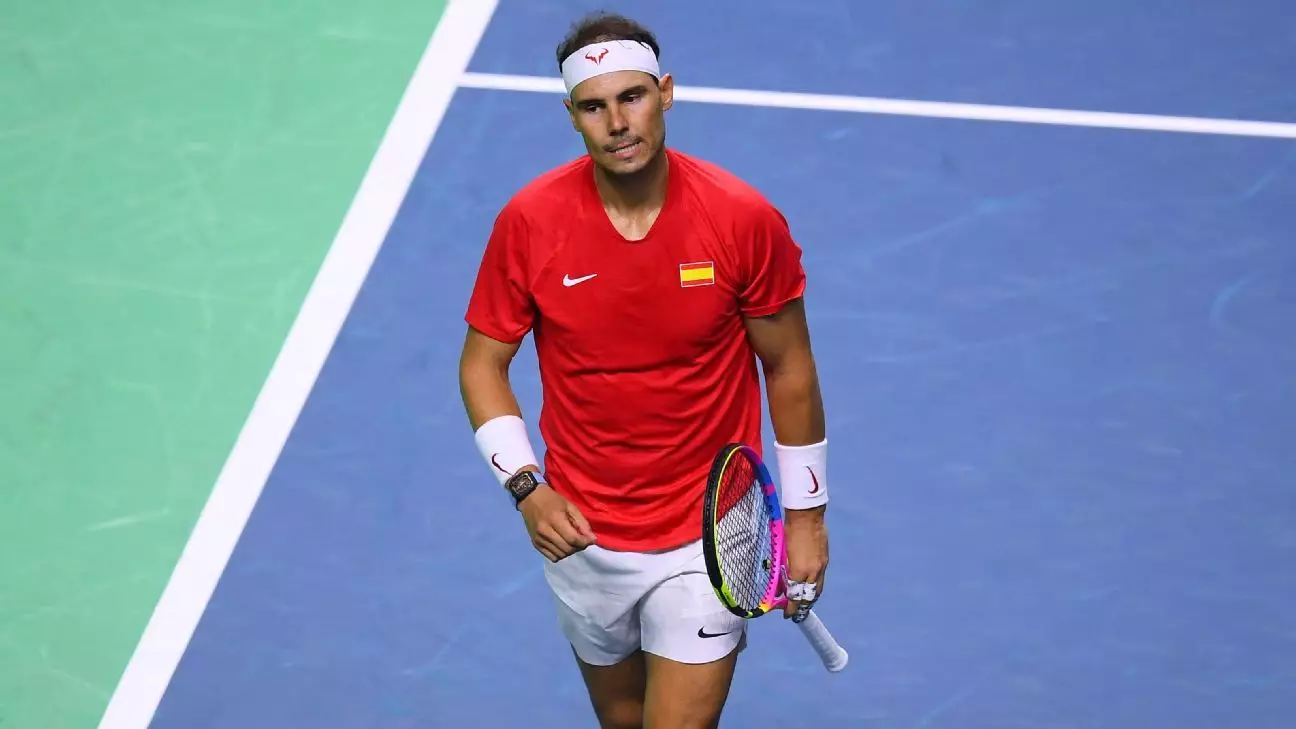Rafael Nadal, a name synonymous with tennis excellence and sportsmanship, faced his demons on a pivotal Tuesday in Malaga, Spain. In a match against Botic Van De Zandschulp during the Davis Cup quarterfinals, Nadal’s defeat was not just a statistical outcome; it was a moment rich with emotional weight. As Nadal nears his impending retirement, his introspection on the court and candid reflections in the aftermath reveal deeper themes of legacy, self-awareness, and evolving roles within a team dynamic.
After the match, Nadal openly assessed his performance with an uncharacteristic level of scrutiny. Given his storied career, expectations loomed large over him—both from fans and himself. In his assessment, he expressed confidence in team captain David Ferrer’s judgment, stating that he would not choose himself for future matches based on his current form. This speaks volumes about Nadal’s character; instead of showcasing defiance or disappointment, he embraced humility. The once invincible player acknowledged that even the most decorated athletes must grapple with their limitations and the inevitability of change.
Moreover, Nadal’s statement, “I lost my first match in the Davis Cup, and I lost my last one,” encapsulates a sense of closure, framing his narrative in a beginning-and-end cycle. It’s a striking reflection that serves to highlight the transient nature of athletic greatness—a theme that resonates with fans and upcoming athletes alike.
The emotional undercurrents of Nadal’s words were palpable. As he recounted his experience of playing in what might be his last singles match, the tension of that moment was almost tangible. He described comfort mingled with anxiety, saying, “Of course, have been an emotional day, nerves before what can be my last singles match.” This duality adds a rich layer to the discussion surrounding elite athletes, a pressure cooker in which joy and anxiety coexist.
Listening to the national anthem for the “last time like professional” brought forth a wave of nostalgia, highlighting that every match transcends pure competition; it becomes a chorus of memories, sacrifices, and dreams fulfilled. Nadal’s recognition of these final moments as profoundly significant points to the complex relationship between athletes and their sport, an understanding that goes beyond tactics and performance statistics.
Nadal’s resolve to continue supporting the team is equally significant. His wish for teammates like Carlos Alcaraz to prevail speaks to a character that remains dedicated to the collective effort rather than individual accolades. Tennis is often depicted as a solitary sport, but Nadal’s perspective enriches the narrative, revealing the importance of camaraderie and mutual support within teams, particularly when facing formidable challenges like the Davis Cup.
Even in defeat, Nadal expressed hope that his team would rally to secure their place in the tournament. His unwavering spirit and commitment to the idea of ‘we’ over ‘me’ serve as a powerful reminder of the core values of sportsmanship. This humane honesty and genuine desire to support his teammates underline Nadal’s lasting impact on both the sport and those who aspire to follow in his footsteps.
As the tennis world watches Nadal’s final moments unfold, it becomes clear that his legacy extends far beyond his impressive collection of titles and records. The essence of his journey lies in his character, his reflections on growth and self-acceptance, and his dedication to the essence of teamwork. Nadal has exemplified that sports are more than just competitions; they are rich narratives filled with lessons on humility, resilience, and camaraderie.
Even as he confronts the reality of retirement, Rafael Nadal’s contributions to the sport will resonate for generations. His ability to acknowledge imperfection makes him relatable, and his desire to inspire others, particularly young aspiring athletes, will be his most enduring legacy. Whether or not he steps onto the court again, Nadal has already won.


Leave a Reply